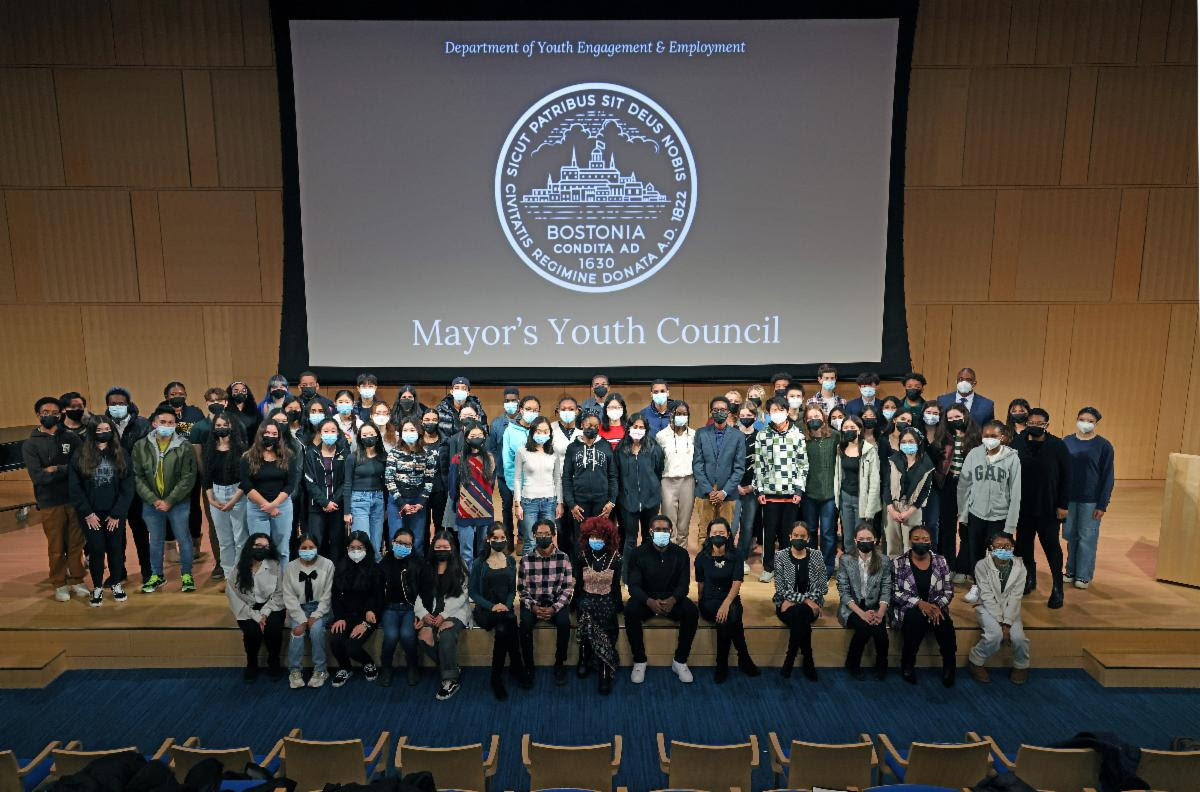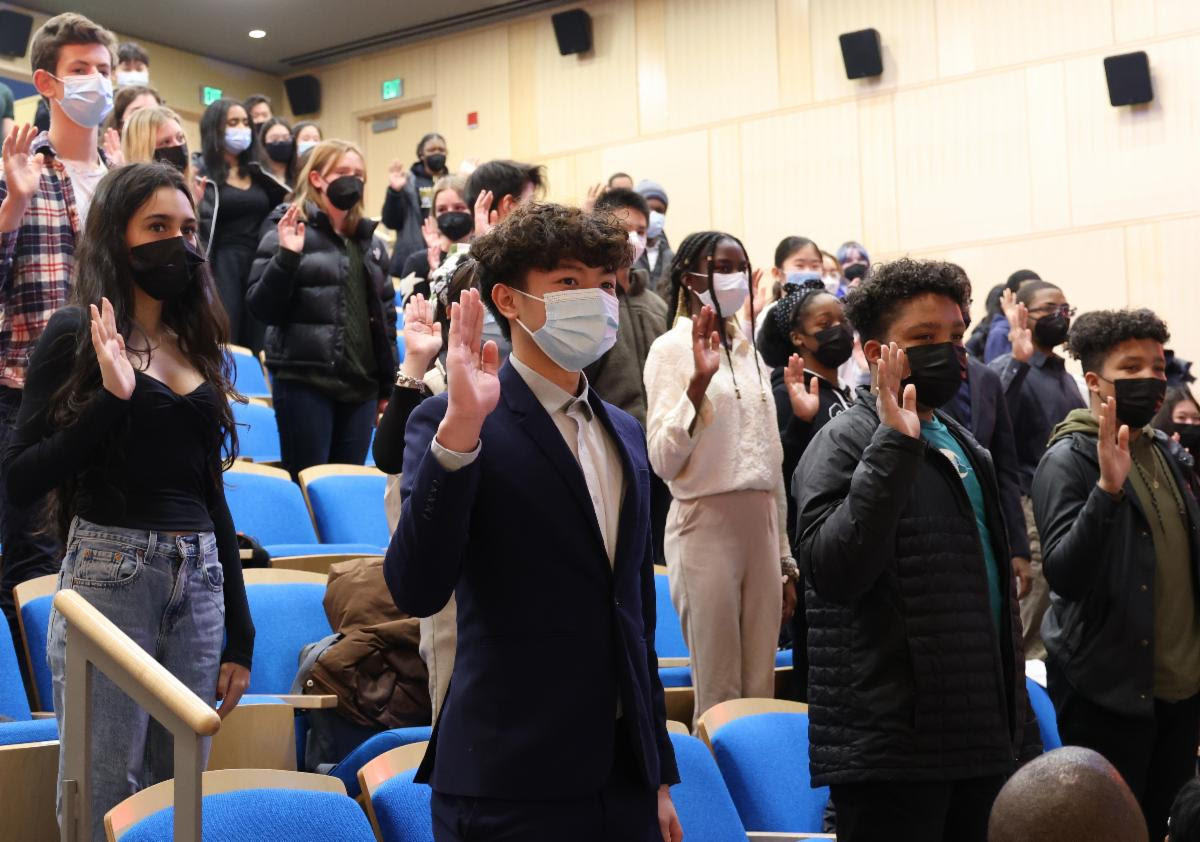New Mayor's Youth Council Sworn In
This group of 86 high schoolers works to engage and empower Boston’s youth through civic participation.
Mayor Michelle Wu yesterday joined the Department of Youth Engagement and Employment to swear in this year’s Mayor’s Youth Council (MYC). These 86 high school students work to give teens a voice in City government by advising the Mayor and her Cabinet on issues pertinent to their peers. This marks the first Youth Council swearing-in since the COVID-19 pandemic began.
“This Youth Council so often serves as the beautiful beginning to a much longer commitment to serving our communities, and I am so excited that these young leaders have accepted this invitation,” said Mayor Michelle Wu. “With the help of the Youth Council, I look forward to continuing to demonstrate just how much is possible in this City with young people leading the way.”
The Mayor's Youth Council is a model of youth inclusion in government and civic engagement. As the first Mayor’s Youth Council in the nation, it has spurred cities across the nation, and even internationally, to examine how they include youth in local government.
Members, or Ambassadors, of the MYC serve for one term and act as representatives for all young people who reside in Boston. Students were selected following an extensive application and interview process announced in April. The number of youth representing neighborhoods is based on census data that indicates where young people live. MYC is a year-round commitment, and members devote 10 to 15 hours a month to meetings, events, projects, and outreach.
“Serving as a youth ambassador for the Mayor’s Youth Council and a co-director of the Workforce and Economic Development Committee is truly an honor and a humbling experience,” said Wesley Ekes, 16, a Dorchester resident, Boston Collegiate Charter School student, and Co-Director of the MYC Workforce and Economic Development Committee. “Having an established environment where youth across Boston can collaboratively brainstorm and implement initiatives across a wide variety of recurring issues is critically important to the success of our city.”
"Youth voices have been undermined and ignored. But I’m so proud of ‘Gen Z’, they are not afraid to speak up,” said Thy Nguyen, 17, a Dorchester resident, Excel High School student, and Co-Director of the MYC Education Committee. “We’re the ones experiencing injustices, who can make better decisions for us if that’s not us?"
MYC representatives form issue-based subcommittees designed by input from youth and are reflective of the overall structure of Mayor Wu’s Cabinet. The current committees include Arts & Culture, Civic Engagement, Climate Action, Education, Public Health, Public Peace, Workforce & Economic Development, and Youth Lead the Change. 22 of the members are elected by their peers to serve as Directors and Liaisons to lead the Youth Council's committees and neighborhood working groups. Each MYC Committee is focused on better understanding the needs of young people and the resources available in the City within their respective impact area.
Historically, members of the MYC have worked on a variety of issues related to public safety, participatory budgeting, and civic engagement. The MYC provided feedback to the MBTA on their 5-year plan for transportation in Massachusetts (GoBoston 2030); guided the community input process for how the City of Boston spends $1 million of the City budget through “Youth Lead the Change” participatory budgeting over the past seven years; and led many discussions around current issues and events for young people during the pandemic.
“Young people are not just our future, but leaders of the current moment, change makers of our current circumstances, and bold, brave advocates for justice, equity, and opportunity today,” said Rashad Cope, Director of the Department of Youth Engagement & Employment. “Boston has always been a city that values its young people, and as we embrace a changing society we know education, healthcare, jobs, public safety, and career pathways require youth decision making. MYC offers a space for youth in Boston to have a voice and confront these and other issues in their neighborhoods, school community, and within city government.”
This year, Youth Ambassadors are also part of a pilot of three neighborhood working groups to facilitate a needs assessment aimed at better understanding the priorities of Boston’s youth. Both Youth Council committees and neighborhood working groups will be supporting the youth needs assessment by crafting a survey of questions to understand youth needs, as well as hosting youth assemblies to amplify youth voice. Each working group will represent different neighborhoods of Boston.
Mayor Wu welcomed the new Youth Council at a ceremony at the Boston Public Library. The swearing-in ceremony usually happens at the beginning of the Council year, but because of the pandemic and transition it was moved to February. Due to COVID-19, the previous Mayor's Youth Council (2020-2021) was fully remote for the entire program. This marks the first year the Youth Council will be back meeting in-person.
To learn more about the Mayor’s Youth Council and the Department of Youth Engagement and Employment, please visit here.



